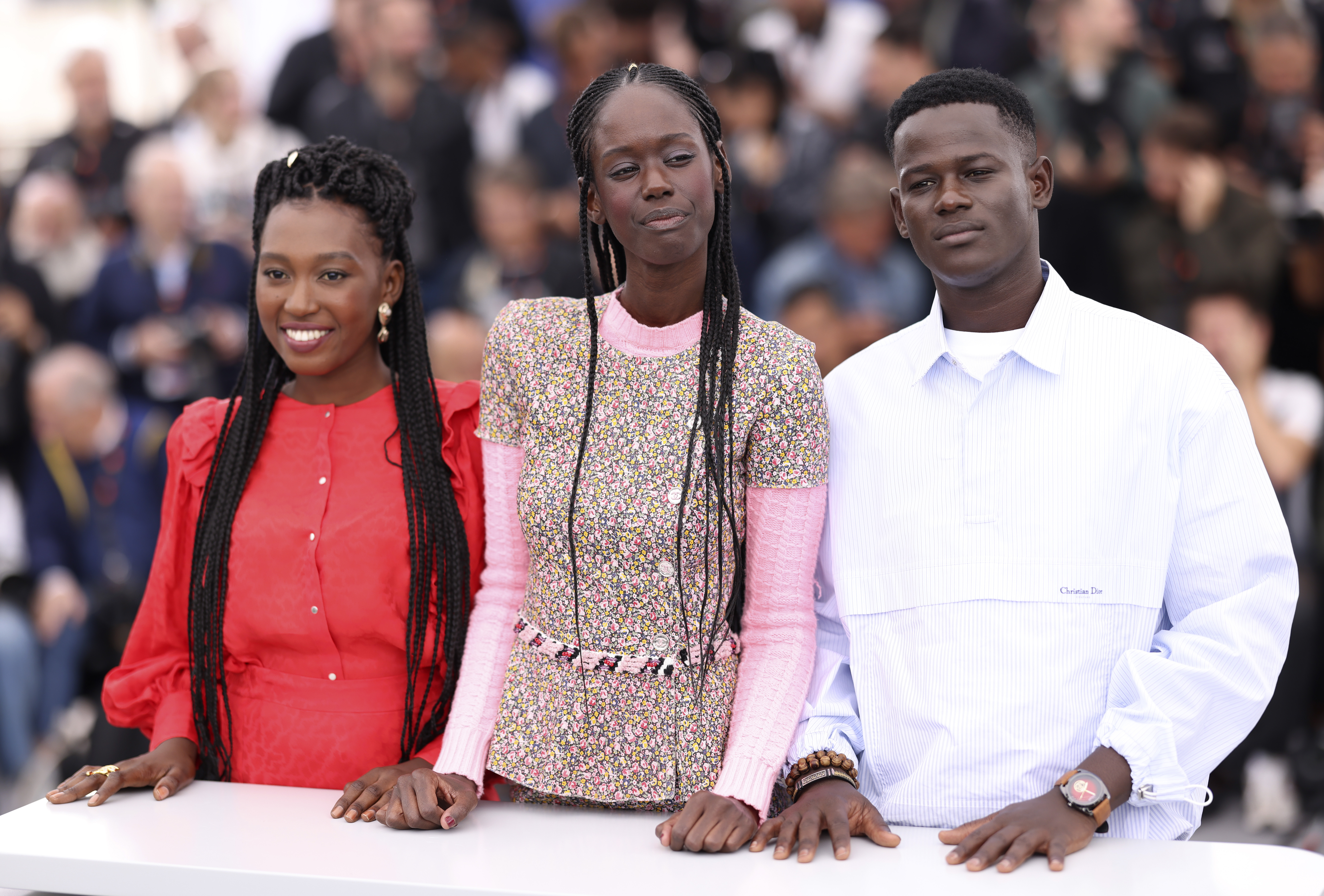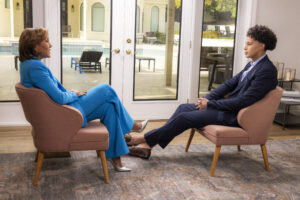The annual Cannes Film Festival in Cannes, France, has a reputation as one of the most glamorous and prestigious film festivals in the world. But the ugly truth is that Black artists are perpetually underrepresented. That pattern continued for the 2023 Cannes Film Festival, which took place May 16 to May 27. Consider:
- Out of the 21 films that competed for the Palme d’Or, the festival’s grand prize, only one was from a Black director: Ramata-Toulaye Sy, for her feature-film directorial debut “Banel e Adama,” a romantic drama set in Senegal. Sy, who is French-Senegalese, is only the second Black female director in Cannes Film Festival history chosen to compete in this category.
- It wasn’t until 2019 that the Cannes Film Festival chose a Black female director to be in the feature-film competition for the Palme d’Or: Mati Diop, also French-Senegalese, for “Atlantics (Atlantiques),” which won the Grand Prix Award, the equivalent of second place in the competition.
- There was only one Black winner for the 2023 Cannes Film Festival Awards: Baloji, who won the New Voice Prize for his feature-film directorial debut, “Omen,” a movie about witchcraft in Africa. Baloji was born in Congo and lives in Belgium.
- There was only one Black person on the nine-member 2023 Cannes Film Festival grand jury: Rungano Nyoni, a Zambian-British filmmaker, who is best known for her 2017 drama “I Am Not a Witch,” which premiered at the Cannes Film Festival that year.
- A Black director has still not won the Palme d’Or.
- A Black director has still not won the Best Director prize at the festival.
- Oscar-winning filmmaker Spike Lee is the only Black person so far to be chosen as president of the Cannes Film Festival grand jury. He served as jury president in 2021. Lee was originally selected for this position in 2020, but the Cannes Film Festival was canceled that year due to the COVID-19 pandemic.

The Cannes Film Festival did not respond to requests from Black News & Views for comments on the low representation of Black filmmakers at the festival and other race-related issues involving how Black people are treated by the Cannes Film Festival. Lee, who is outspoken about civil rights issues pertaining to Black people, also did not respond to a Black News & Views’ request for comment on how the Cannes Film Festival handles representation of Black filmmakers. As of this writing, two movies directed by Lee have had their world premieres at the event: 1989’s “Do the Right Thing” and 2018’s “BlacKkKlansman.” The latter film won the festival’s Grand Prix Award.
“Banel e Adama” director Sy told the French newspaper Le Monde: “I am very proud to represent Africa at Cannes. And I am happy that there are so many of us this year. But we shouldn’t have to count African filmmakers, that should be the norm.”
It should be noted that although the Cannes Film Festival had six feature films from African directors this year, four of those movies are from African filmmakers who identify as Arab, not Black. These filmmakers are “’The Mother of All Lies” director Asmae El Moudir, who is from Morocco; “Les Filles d’Olfa” director Kaouther Ben Hania, who is from Tunisia; “Les Meutes” director Kamal Lazraq, who is from Morocco; and “Goodbye Julia” director Mohamed Kordofani, who is from Sudan. “Goodbye Julia” is the first movie from Sudan to be selected for the Cannes Film Festival.

Compared to other high-profile international film festivals, where Black directors make up at least 15% of awards contestants, the Cannes Film Festival has been slow to include fair representation of Black filmmakers, considering the sizable percentages of Black people who regularly go to the movies. According to a 2022 report by the data analysis website Statista, 44% of Black people in the United States (the world’s largest movie market) describe their moviegoing habits as “sometimes” and “often,” compared to 52% of people who identify as Hispanic, 39% who identify as white, and 35% who identify as Asian or “other.”
Although the Cannes Film Festival is primarily known for movies, television series have also made their way to the festival for world premieres. In this respect, Black representation was questionable at best at the Cannes Film Festival this year. Black Canadian entertainer Abel Tesfaye, better known as singer-songwriter The Weeknd, faced negative publicity and bad reviews as a star and executive producer of the six-episode HBO limited drama series “The Idol,” whose first two episodes premiered at the 2023 Cannes Film Festival. In “The Idol,” Tesfaye stars as an abusive cult-like guru who gets involved in a toxic relationship with a pop star, played by Lily-Rose Depp. Most critics of “The Idol” say that the show is sleazy and very degrading to women.
“At times it can feel pretty racist, like a sunny, idyllic version of 1960s Alabama, where a party of more than one Black person gets routinely rejected from some clubs/bars/restaurants.”
Black French filmmaker Aude Conan
An independent group called Diversity in Cannes, which is not affiliated with the Cannes Film Festival, aims to increase the numbers of filmmakers from underrepresented groups at the Cannes Film Festival. The main initiative of Diversity in Cannes is the Diversity in Cannes Short Film & Web Series Showcase, where participants (for a fee) can enter a contest to be selected for the showcase. It’s not a guarantee that the winners will be selected for the Cannes Film Festival, but the showcase takes place in Cannes during the same time period as the Cannes Film Festival, as a way to raise more awareness for these filmmakers. Representatives for Diversity in Cannes could not be reached by deadline for this piece.
It’s not just Black filmmakers who are underrepresented at the Cannes Film Festival. There’s also a low number of Black journalists covering it, compared to journalists of other races. Valerie Complex, an associate editor at the industry trade website Deadline, detailed her experiences with racism as a Black woman at the 2022 Cannes Film Festival in an essay for Deadline. Complex did not attend the Cannes Film Festival this year. Although the festival approves which journalists will have access, a separate issue is that media outlets hire a very low number of Black journalists to cover the festival.
For now, Black filmmakers and other Black people who go to the Cannes Film Festival have to navigate a gathering that, based on data, is not as welcoming to filmmakers who are Black as it is to filmmakers of other races.
Black French filmmaker Aude Konan shared his experiences at the 2019 Cannes Film Festival, in an essay published that year on the website Okay Africa.
“Despite the fact that the festival is incredibly international, at times it can feel pretty racist, like a sunny, idyllic version of 1960s Alabama, where a party of more than one Black person gets routinely rejected from some clubs/bars/restaurants,” Konan wrote. “On top of that, the staff and some of the security working at the festival can be incredibly aggressive and rude to you and in French. If you don’t understand it, it’s even more confusing.”
In a separate piece for Okay Africa, Konan also issued a reminder that the Cannes Film Festival isn’t the only option for Black-oriented entertainment from emerging filmmakers.
“Cannes’ progressive pace is incredibly slow, but pales in comparison to what Netflix and even YouTube offers to Black people yearning for content that truly represent[s] them and gives them a humanity often denied,” he wrote.






